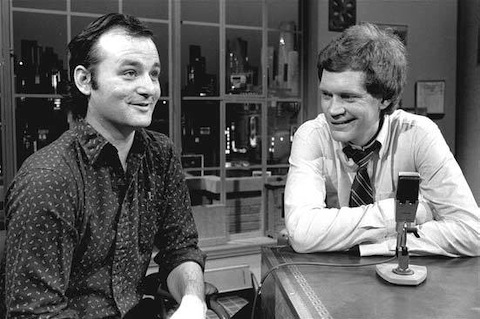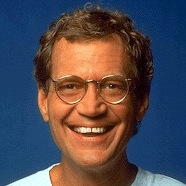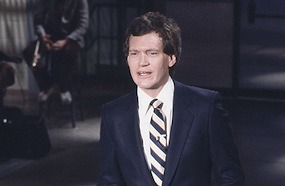Oct 2009
A vintage, self-analytical Letterman during a rare one-on-one sit-down
07/10/09 07:57

Note to readers: Some things haven't changed about David Letterman. He still has an aversion to doing one-on-one interviews. But back in his formative years, he did a few. This one, from his Manhattan office, occurred during the second year of Letterman's Late Night NBC show. Note his newfound reluctance to interview politicians. Obviously that's changed. Letterman also worried about becoming a spectacle on Entertainment Tonight. Post-sex scandal, he has no control over that. This article originally was published on Oct. 2, 1983.
By ED BARK
NEW YORK -- It's noontime with David Letterman, and he's nowhere near ready to put on the sportcoat and tie he must tolerate as host of NBC's late night "extravaganza."
Ready as he'll ever be for one of his rare interviews with the press, Letterman is wearing a Chicago Cubs cap and gray T-shirt and Levis. Scattered about his office on the seventh floor of NBC's "30 Rock" building are a tetherball, a whiffle ball and two major league baseballs, one carrying the all-but-rubbed-off autograph of future Hall of Famer Johnny Bench.
"Johnny's going to be upset," Letterman jokes.
Letterman, stick-thin and known to be a bit thin-skinned, is trying very hard to be more talkative, both on- and off-camera. Although he is paid to be a conversationalist, the 36-year-old Midwesterner can be a very shy guy. His shortcomings as an interviewer have kept many TV critics from falling hopelessly in love with Late Night with David Letterman. Ouch, it's a sore spot with him.
"I would like to think I've improved, but who knows," he says. "So I'll take the responsibility for that. What the hell, it's my show, so I ought to shoulder the criticism. Hopefully, my confidence has improved a little bit. It's something that I work on every day. It's criticism that I don't take lightly. I may never be the greatest talk show interviewer in the world. And even if I were, I'm not sure that there's a trophy that goes with that."
Letterman says he's becoming a better mixer because the mix of guests has improved on Late Night, which premiered Feb. 1, 1982 and took six months to "shake out."
"In the beginning we got generally good reviews," he says. "I thought critics were giving us the benefit of the doubt because I knew what kind of turmoil was going on here. You don't know what you're doing. You're shooting in the dark. The first six weeks are kind of a misleading period and you go through them kind of glazy.
"Generally we're not as frantic as we used to be. In the beginning you've got all of this stuff saved up and you just can't wait to get it on the air. And then you realize that you've got to pace yourself. The early shows had kind of a jarring effect. People wanted it to slow down, so we've tried to find a more viable pace."
On the early Late Nights, Letterman says he made the mistake of interviewing too many people "from politics and current events."
"It wasn't working because that's not what I was prepared to do," he says. "So we kind of eliminated those people. I'm not David Brinkley, I'm not Ted Koppel. So it took us awhile to sift that out."
Still, Letterman is fighting the nightly urge to become a chameleon who absorbs his guests' moods for better or worse.
"When a guest comes on and gets timid, I just tend to get timid," he says. "If a guest comes on and is confident, then my confidence goes up. Unfortunately, this is just the opposite of the way this ought to work. If a guest comes out and is timid, I should be reassuring. But that's just my nature.
"I'm very shy and if I sense that somebody would rather not be there, then I think, 'Well, let's get them back outside as quickly as we can.' So I have to overcome that, but it's tough. I still have nights when I go home feeling that I've ruined a pretty good interview possibility."
On a recent show, the featured guest was Robert Klein, the brilliant improvisational comedian who, as Letterman says, "really understands what is expected of a person on a talk show."
"I could be in a mild coma, and Robert Klein would have still been entertaining," Letterman says. "In fact, maybe that would be better."
As his show goes on and on (No. 300 is on Oct. 18), the temptation is to play it safer, to take it easier. Guests such as Klein make it very easy on Letterman or any other talk show host. But . . .
"As good as Robert Klein is, he's on a lot of shows," Letterman says. "It's a mixed blessing. When I see Robert Klein, I know I don't have to worry. On the other hand, haven't we seen Robert Klein a lot before? For every customary talk show guest, you take some chances and do some pioneering. But then, that makes me nervous, because you don't know what the expectation is."


The strength of Late Night is its careening comedy skits. Letterman occasionally might be a stiff behind the desk, but all is forgiven if he hits it big with a bit. Again though, the temptation is to follow familiar, albeit twisted paths. If they love "Stupid Pet Tricks," hey, let's do it eight days a week.
"To our discredit -- maybe that's too harsh a word -- you get less and less experimental," Letterman says. "You reach a plateau and you tend to get a little complacent. Recently we've had a big changeover in the writing staff, so that's good because it forces us into a little bit more experimenting. It's just like anything else. You go to a restaurant, you order your favorite things time after time because you know they'll be great. And that's the same thing you do with a show. You stockpile a lot of reusables. I don't think you ever get back to the point where you were in the beginning."
Often, Letterman must scratch and claw for a few laughs from a sketchy piece of material. On The Tonight Show, Johnny Carson is the acknowledged master of defusing a bomb. Watching him die can be as much fun as seeing him score with a dynamite bit.
"He (Carson) knows it's not gonna work every night, so you try, as they say, to make lemonade out of lemons," Letterman says. "You have to let the audience know that it's not important whether the bit works or not. We're pretty much doing disposable comedy here, night after night after night. If we can get a sketch that'll work 50 percent of the time, and people get a couple of genuine laughs out of it, then that's great. You have to let the audience not be embarrassed for you. If it doesn't work, you don't want them to just shudder. So you say to them, 'Look, I know it ain't workin', but what the hell, give us a break.'
"Take a look at the movies released in this country that are comedies," he adds. "How many moments will you actually laugh in what is a comedy movie? The ratio is very low, and here is a project that took maybe six months to write and a year to produce. So anybody that thinks they can do side-splitter, killer comedy on a nightly basis is dreamin'."
Early in his show biz career, Letterman was a standup comic, arguably the roughest profession this side of making change in a toll booth. Now his life belongs to Late Night, with no sidelights.
"I don't know if I'd ever get back into standup," he says. "It was something I never truly enjoyed. It was always a lot of pressure. I've never really considered myself a standup comic, a Robin Williams or somebody who would just do it night after night, and really thrive on it. I'm just not that way. I've been very lucky that I've had to do less and less of it."
Lately he's been doing a few more interviews with TV critics. There is some calculation involved here, no doubt. Letterman has some new late night competition, the syndicated Thicke of the Night hosted by Canadian personality Alan Thicke. Also, the ratings for Letterman's show have dipped a little in the last two weeks. The latest numbers, a 2 rating, 12 share and a 2.1 rating, 13 share for Sept. 5-15, are the lowest ever for the show, which averaged a 2.9 rating from January through July of this year. Letterman says he stopped doing interviews for a while because he got tired of hearing himself talk.
"I'll tell you what happened," he says. "This is a backlash from the first wave, when they (NBC) kept sending people in. And after a while, all you can hear is your own voice saying the same stupid things over and over again. I'd go home and turn on Entertainment Tonight, which is loaded with celebrities saying stupid things about themselves. I'd sit there and I'd punch my girlfriend (Merrill Markoe at the time) and say, 'Boy, they sound like complete fools.' And then, of course, I realized that if they sound like jerks, I sound like a jerk. So I just got to the point where I said, 'Let's give it a rest for a while.' "
On Late Night, there can be no rest for the wicked humor of David Letterman. The night shift suits him best, and he'd like to work it for a good long stretch.
"My goal for the show was to just make it a fixture of American television," Letterman says. "I'm not saying we're there yet, but if I thought we were gonna be here five years, that would make me very happy."
